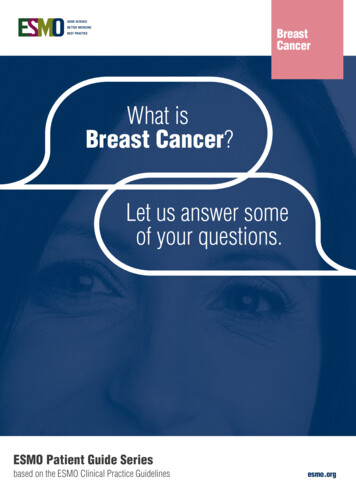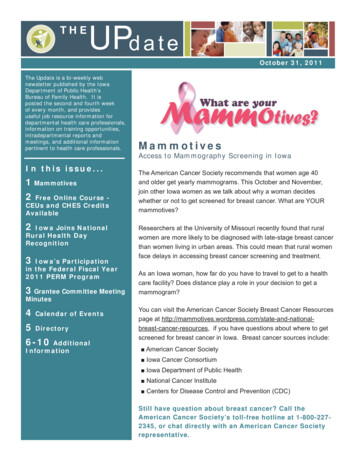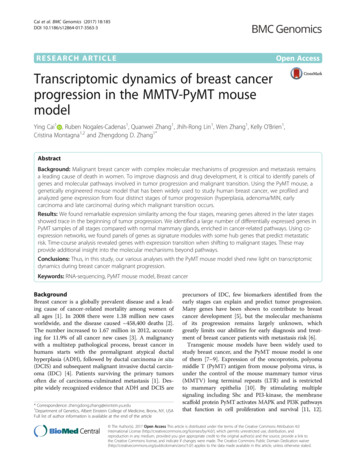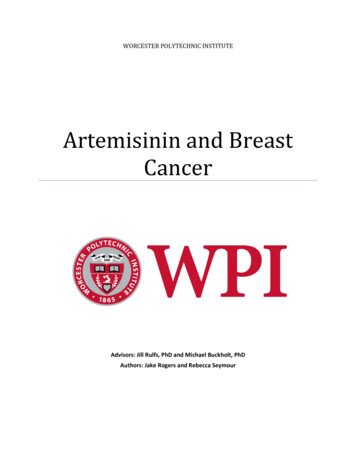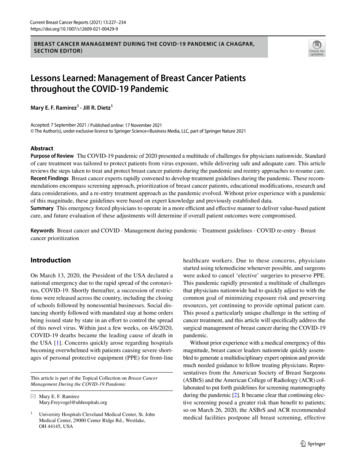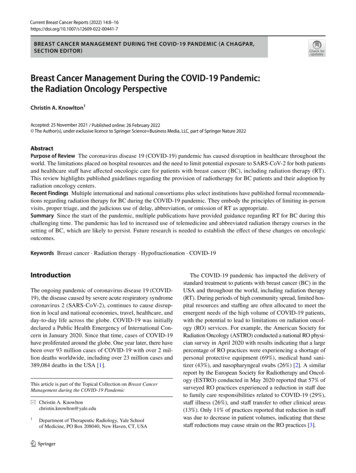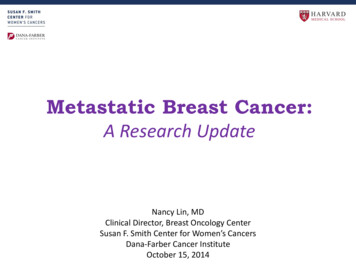
Transcription
Metastatic Breast Cancer:A Research UpdateNancy Lin, MDClinical Director, Breast Oncology CenterSusan F. Smith Center for Women’s CancersDana-Farber Cancer InstituteOctober 15, 2014
Overview Breast cancer subtypesRecent drug approvalsExciting research directionsClinical trials
Breast Cancer Subtypes There are three main subtypes ofbreast cancer Within these, there are other waysto further sub-divide breast cancers Oncologists use the breast cancersubtype to guide the kinds oftreatments to recommend Clinical trials often will focus onspecific subtypes
Breast Cancer SubtypesBreast cancer subtypeEstrogen receptor and/or HER2Progesterone receptorER-positive(Hormone receptorpositive) -HER2-positive or -Triple-negative --
Breast Cancer SubtypesBreast Cancer K to your doctor if you are not sure what type of breast cancer you have
How Do We TreatMetastatic Breast Cancer?Hormone tin perjeta ltherapyChemotherapyChemotherapyLapatinib CapecitabineChemotherapyChemotherapyHerceptin chemotherapyHerceptin chemotherapy*Note, these are just examples. Each patient is different and treatment is tailored accordingly.
New Drug Approvals:Everolimus (Affinitor) 3.2Aromasin months*Aromasin 7.8 months*Side effects: tiredness, mouth sores low Affinitorblood counts, etc*Median time from study entry until worsening of cancer. The median overall survivalwas 26.5 months in the aromasin group and 31 months in the aromasin affinitor group.Approved by the FDA in 2012 for patients with metastatic, hormone-receptor positive,HER2-negative breast cancer
New Drug Approvals:Eribulin (Halaven) Metastatic breast cancer At least 2 priorchemotherapiesApproved by the FDA in 2011Halichondria okadai
New Drug Approvals:Pertuzumab (Perjeta)Trastuzumab docetaxelTrastuzumab Docetaxel Pertuzumab 40.8 months* 56.5 months*Side effects: more diarrhea, rash,low blood counts*Median overall survival of patients enrolled on studyApproved by the FDA in 2012 for first-line treatment of HER2 metastatic breast cancer
New Drug Approvals:TDM1 (Kadcyla)HER2Receptor-T-DM1 complex isinternalized into HER2-positivecancer cellT-DM1 binds to the HER2 proteinon cancer cellsPotent antimicrotubuleagent is released once insidethe HER2-positivetumor cell
New Drug Approvals:TDM1 (Kadcyla) Tested versus lapatinib (Tykerb) pluscapecitabine (Xeloda) in 2nd line: superior Tested versus “treatment of provider choice”in patients who had received multiple priortreatments: superiorApproved by the FDA in 2013 for HER2 metastatic breast cancer previouslytreated with trastuzumab and a taxane
What’s New on the Horizon?
Polyak and Filho, Cancer Cell, 2012
Polyak and Filho, Cancer Cell, 2012
What’s Exciting in ER Breast Cancer Testing of CDK4 inhibitors in clinical trialsDiscovery of ESR1 mutations in metastasesNew estrogen receptor modulatorsPI3K inhibitorsMany more
The Cell Cycle PathwayCDK4 inhibitors:PalbociclibAbemaciclibLEE011
What’s Exciting in Triple-NegativeBreast Cancer Discovery of distinct subtypes of triplenegative breast cancer PARP inhibitors/combinations Androgen receptor antagonists Platinum agents
Triple-Negative Breast CancerIs Not All the Same DiseaseLehmann et al, JCI 2011
PARP Inhibitors in BRCA Carriers Tumors of BRCA 1/2 patients lose 2important ways torepair DNA whentreated with a PARPinhibitor Multiple trials testingPARP vs chemo inBRCA 1/2 carriers rightnow
What’s Exciting in HER2 Breast Cancer New HER2-targeted drugs– some cross the BBB Combinations of HER2-targeted drugs PI3K inhibitors
New HER2-Targeted Agentsin Clinical Trials NeratinibAfatinibARRY-380/ONT-380KD019MM-302
Targeting the PI3Kinase PathwayPolyak and Filho, Cancer Cell, 2012
Drugs Targeting PI3K in Trials BYL719GDC0032BKM120GDC 0941Many others
Immunotherapy
The Promise and Perils of“Specialty Gene Testing”Obtain tumorbiopsy materialExtract DNA/RNA fromtumor to profile forsomatic alterationsNo proof as of yet that results of these tests should alter “standard of care” treatment.Primary purpose in breast cancer in 2014 is to identify patients for clinical trials
“I’m interested in clinicaltrials. How can I find out ifthere is one right for me?
Think about your goals and priorities Trials range in complexity, frequency of studyvisits, time commitment, need for travel.– Ask yourself, what makes sense for me?
Educate yourself Learn what subtype of breast cancer you have Learn about the types of clinical trials Talk to your doctor and/or nurse Learn about your family history and consider BRCA testing Check out on-line resources Consider a second opinion at an academic practice with afocus on clinical trials
Types of TrialsPhaseTypical # patientsVisit intensityWhat is knownabout the drugRandomizationI15-30Often highFirst-in-human,Or new comboTypically noII30-50 (non randomized)50-200 (randomized)IntermediateSomepreliminary datafrom phase IDepends on trialIIISeveral hundredUsually thelowestTypically have a Typically yesgood sense ofthe side effectprofile and somepreliminary antitumor results
On-Line ResourcesOrganizationWebsiteNational Cancer Institutewww.cancer.gov/clinicaltrialsNational Cancer uestionsto-ask-about-participatingAmerican Society ofClinical Oncologywww.cancer.net/patient/All About Cancer/Clinical TrialsAmerican Cancer ffects/Clinicaltrials/indexLiving Beyond orgwww.breastcancertrials.orgU.S. National Institutes linicaltrials/findingatrial.htmCoalition of cancercooperative /Hospital websitesMany; look for academic institutions in your region
Summary Not all breast cancers are alike We have many clues and we are makingprogress But we need clinical trials and continued basicand translational research to make newbreakthroughs for metastatic breast cancer
ARRY-380/ONT-380 KD019 MM-302 . Polyak and Filho, Cancer Cell, 2012 Targeting the PI3Kinase Pathway . Drugs Targeting PI3K in Trials BYL719 GDC0032 BKM120 GDC 0941 Many others . Immunotherapy . The Promise and Perils of
